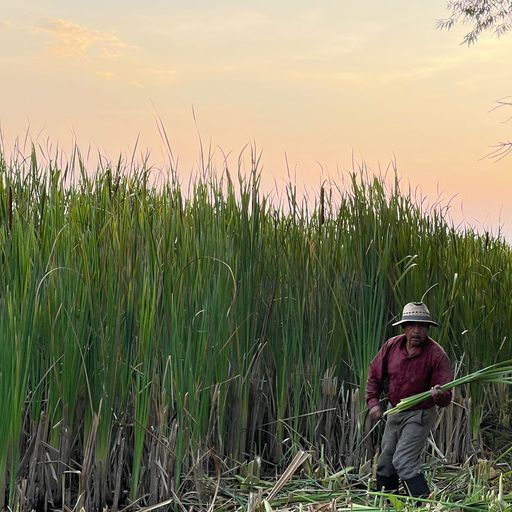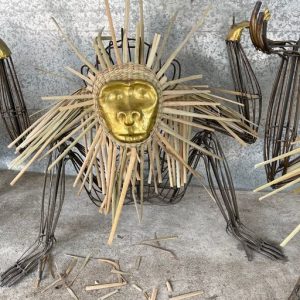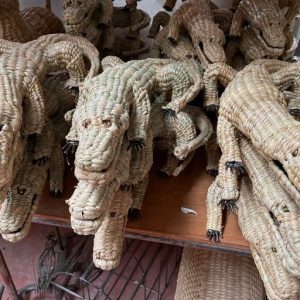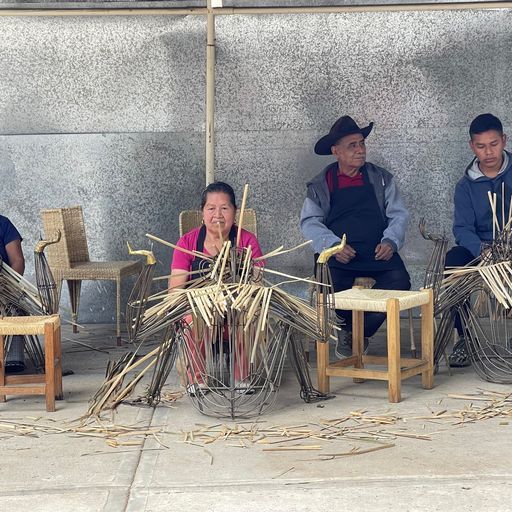From grass harvesting to detail finishing, every step of the process happens locally.
As the proprietors of popular Palm Beach vintage store Circa Who, which has been supplying locals with restored furnishings for over 18 years, Scott Mast and Juan Goiricelaya know how to spot a winning design. One of the shop’s mainstays, a collection of whimsical woven pieces often crafted to resemble animals (think: a monkey holding a pendant light aloft, or a giraffe that opens into a bar), is instantly recognizable to regular customers of the shop. Not so much the designer himself: “Not many people in Palm Beach knew Mario Lopez Torres’s name, but his pieces were always a huge hit in the store,” Mast recalls.
In reality, Torres has been creating his signature furnishings in Mexico for nearly 50 years.
Torres’s eldest son, Balam Lopez, says his father developed his technique after an art teacher instructed him in metalworking. First, he creates skeletons for each furnishing by bending and welding metal; then, he weaves straw around the metal frame to create all manner of flora and fauna-inspired shapes. “His first piece was a coyote that a town leader commissioned to give to the governor at that time,” says Lopez.
In 1973, Torres set up shop in Puebla, Mexico, bending and weaving his beloved creations mostly by special order: “My father decided to make each piece mainly upon request, although he also made some just because he wanted to,” Lopez says. “If he liked a particular animal, he wanted to do it.”
“[My father] began with a dream of working with vegetable fiber.” —Balam Lopez
Torres’s affinity for animals is simple—and personal: “He is from the city and has always loved the countryside, and part of that love for the countryside is reflected in the animals,” says his son. In Torres’s hands, metal wire and flowing grasses become three-dimensional creatures, often with touches of copper or aluminum to create faces, eyes, or paws—each piece has enough personality to almost become a living part of the room.
“He tried to bring the jungle home,” says Lopez.
Before his children were born, Torres did the opposite, relocating from Puebla to a lush, remote town in the mountainous region of Michoacán. His studio came with him—and became deeply entwined with its new home: Grasses for Mario Lopez Torres furniture were (and still are) harvested from the bed of the river that runs through the town, and the studio’s workforce is made up of local weavers.
It’s a team that grew substantially a few years ago when Torres went into partnership with Mast and Goiricelaya to distribute his designs in the U.S. and abroad.

The company
Though Torres has always been prolific in ideas, an insistence on slow, handmade craftsmanship over mass manufacturing and marketing—coupled with a conscious desire to stay off the grid—meant that his output was much less substantial. After a bit of coaxing, Goiricelaya and Mast convinced him to expand production—provided that it would become a source of financial stability for Lopez’s community.
So the three went into business, committing to manufacturing 300 pieces each year, all welded, woven, and finished in a small town in Mexico using local grasses.
“In town, there are certain families that specialize in certain animals,” Mast says. “So there may be one who creates only monkeys, another all elephants.”
Two years ago, Torres passed away, leaving the legacy of his imaginative creations to his wife, children, and the weavers who continue to follow the guidance he so diligently laid out for them.


That’s not to say there aren’t new designs, though: “We have also found many designs in sketches that we would like to bring to the world now,” says Berenice Lopez Monroy, who, along with her brother, is continuing her father’s legacy at the studio in Michoacán, where she was born.
“My job is to take the pieces to another level in terms of technique and quality, and to make them known to more and more people,” says Monroy.
Lopez sees his purpose in much the same way: “Now that my father is not here, the future of his work is mine to continue,” he says. “Even though for a long, long time as a young man I disavowed it, now I understand that my dad’s legacy is very big and it is in my hands to make it prevail.”
